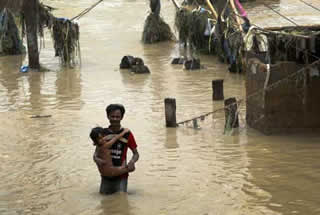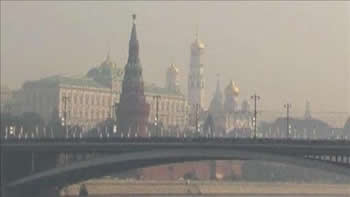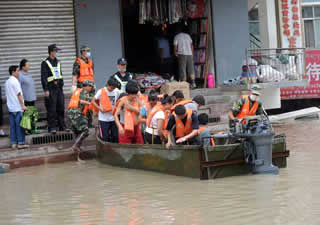The Care of Creation:
"Choose Life for You and Your Children"
A guest essay by Bill McKibben. McKibben is an American environmentalist and writer who frequently writes about global warming and alternative energy and advocates for more localized economies. In 2010 the Boston Globe called him "probably the nation's leading environmentalist" and Time magazine described him as "the world's best green journalist." See http://www.billmckibben.com/
For Sunday September 5, 2010
Lectionary Readings (Revised Common Lectionary, Year C)
Jeremiah 18:1–11 or Deuteronomy 30:15–20
Psalm 139:1–6, 13–18 or Psalm 1
Philemon 1–21
Luke 14:25–33
What a summer we’ve witnessed, a summer like no other in human history. The researchers at the National Oceanic and Atmospheric Administration confirmed in July that we had just come through the hottest six months, the hottest year, and the hottest decade on record. Seventeen nations have seen new all-time temperature records, which is in itself a record. In late May, in Pakistan, a new all-time record for all of Asia was set, when the mercury reached 129 degrees. That’s. . . hot.
But numbers can be abstract, and hard to connect with, especially if you weren’t the one wandering around in the 129-degree heat. So this summer we’ve also seen palpable signs of what these records mean — what a globally warming world looks like. For instance:
 |
Floods in Pakistan 2010. |
* In Greenland a chunk of ice four times the size of Manhattan broke off a northern glacier and floated out into the ocean.
* In Russia a heatwave of epic proportions tested human endurance. It had never reached 100 degrees in Moscow before; in early August, it reached it almost every day. Massive fires filled the city with eerie, choking smoke; the drought was so intense that the Kremlin stopped all grain exports, turning around train cars that were headed for ports, and spiking the world price of grain.
* And most devastatingly, in Pakistan, in China, and in the Himalayas, record rainfalls produced devastation. Scientists had been warning that flooding was on the increase — warmer air holds more water vapor than cold, so the chances of deluge are higher than they used to be. But those warnings did little to prepare anyone for the reality. The mammoth rainfalls put 20 million people on the move in Pakistan; there’s scarcely a bridge left along the route of the Indus River, a humanitarian crisis bigger, according to the experts, than the tsunami and the Haitian earthquake combined.
This trouble is no mystery. It stems from our unwillingness to live according to the dictates of Creation — to use the language of Deuteronomy, it stems from our unwillingness to “walk in the ways of the Lord, to keep his commands, decrees, and laws” (Deuteronomy 30:15). Doubtless God could have made this world in any number of ways, but the way he chose has certain features. The most important to this discussion are:
 |
Moscow smoke 2010. |
1) If you burn fossil fuel, you produce carbon dioxide. Lots of it — a gallon of gas weighs about 8 pounds, and when its burned it gives off about five and a half pounds of carbon. It doesn’t matter how well-tuned your engine is; CO2 is an inevitable byproduct of burning coal, gas, or oil.
2) The molecular structure of CO2 traps heat near the planet that would otherwise radiate back out to space. That’s why the planet has warmed one degree already, and why scientists warn us that unless we stop burning fossil fuel very quickly it will rise another four or five degrees in the lifetimes of the youngest people in our congregations.
To take these facts seriously is to take Creation seriously. We can’t do our work of stewardship unless we understand the basic ground rules. Science has provided them; we should be grateful.
It’s no mystery, either, though why people in the rich countries don’t want to hear this news. We like burning fossil fuel — from the moment we get up in the morning to the time we go to bed at night, almost every action of a modern life requires us to burn coal or gas or oil. Turning on a light, turning on the oven, taking a shower, driving to work, firing up the computer — the list is as endless and varied as our lives. There are other ways to provide that power, of course — God has also given us a world awash in sun and wind, and engineers have figured out to harness that power. But right now it’s not quite as cheap as coal and gas and oil, and in our shortsightedness we’re not willing to make the leap to that new world. We bow down to other gods, and the strongest of those gods goes by the name “Economy.”
Maybe the saddest part of this story is that carbon dioxide, in this creation, mixes completely in the global atmosphere. That is, even though people in Pakistan use very little fossil fuel, their atmosphere is the same as in America, where people are the world champions of carbon production. And because Pakistanis are living closer to the edge, they suffer faster than Americans. Instead of loving our neighbors, we’re drowning them.
 |
China floods 2010. |
It’s important that Christians around the world unite to send aid to those people now in desperate need. But it’s equally important that we unite to actually change the factors driving this damage. On 10-10-10, people around the world will join in a huge Global Work Party, coming together to put up solar panels or dig community gardens or lay out bike paths. They’ll do it not just because those are good things, but because they want to send a strong message to our political leaders, who so far have done so little. That message? “We’re getting to work. Now it’s your turn. If I can climb up on the roof of the church and hammer in a solar panel, I expect you to climb to the floor of the Senate or the Parliament or the Politburo and hammer out the new laws we need to send us in a new direction.”
10-10-10, as it happens, is the Sabbath. It's a day, as Jesus said, not just to reflect on the goodness of the earth we’ve been given by a gracious God, but to make sure that that goodness is spread to those most in need. As a civilization we need finally to make that choice between “life and death, blessings and curses” (Deuteronomy 30:15, 19). There’s nothing metaphorical about the language from Deuteronomy: “choose life, so that you and your children may live” (Deuteronomy 30:19). The stakes have never been clearer than this summer.
For further reflection:
* For more information on the 10-10-10 Global Work Party, please visit 350.org
* For Bill McKibben's website see http://www.billmckibben.com/
* See Bill McKibben, Deep Economy; The Wealth of Communities and the Durable Future (New York: Times Books, 2007).
* See Bill McKibben, Eaarth; Making a Life on a Tough New Planet (New York: Times Books, 2010).
Image credits: (1) Allianz.com; (2) The Wall Street Journal; and (3) Xinhuanet.com.





